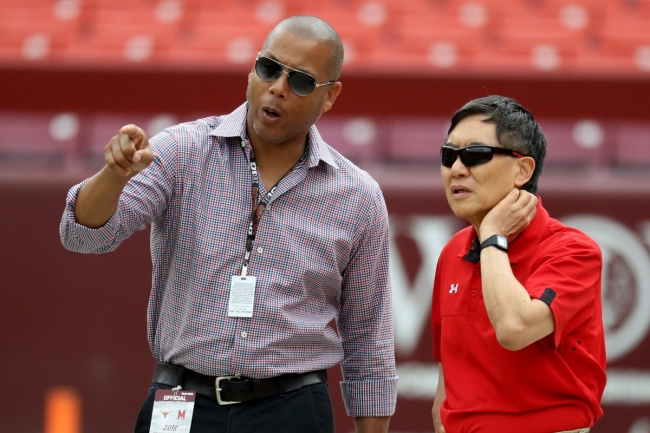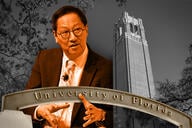You have /5 articles left.
Sign up for a free account or log in.

Maryland president Wallace Loh, right, with Damon Evans, the athletics director
Getty Images
Months after a football player died and revelations emerged that the University of Maryland at College Park football program was plagued by coaching abuse, the institution’s embattled president, Wallace D. Loh, announced he will retire in June.
Head football coach DJ Durkin, who has been on paid leave since August following explosive media reports of rampant cruelty and mismanagement in the program, will return, as will athletics director Damon Evans.
Loh announced his departure at a Tuesday news conference.
Reporters pressed Loh over accounts that he wanted Durkin gone, but that the University System of Maryland’s Board of Regents -- the state’s governing body -- had strongly urged Loh to keep Durkin in his position and that Loh would be fired if he did not comply.
While Loh was highly complimentary of Evans during the news conference, he did not mention Durkin unless asked a direct question. Loh only said that Durkin had been a successful coach on the field, and that the president had accepted the recommendations of the regents.
"Since I arrived on this campus, in October of 2010, I have had the honor and the pleasure of working alongside some of the most impressive faculty, staff, students, alumni and friends of the university to advance our beloved flagship institution. For me, the job of president is more than a job. It’s a calling to service," Loh said at the press conference. "It is a calling that I believe is larger than simply having a job. Together with all of these stakeholders, I believe we have boldly transformed the university. Today, the university deservedly stands as one of the most distinguished institutions of learning in the country. I’m proud of the shared legacy that’s been created and I will have more to say about that at a later time."
While Loh has been popular with both campus constituents and state lawmakers, and is recognized as a successful fund-raiser, more recently he has been criticized for the university’s obvious failures in overseeing athletics.
The saga began in May, after redshirt freshman Jordan McNair passed out from heatstroke after a practice.
McNair died days later, in June, for which the university took “legal and moral” responsibility, Loh said. In the months that followed, news media reported widespread abuse by Durkin and strength coach Rick Court, who negotiated a $315,000 settlement from the university and left in August. McNair’s parents, who have indicated they will sue over their son’s death to the tune of millions, had called for Durkin’s dismissal.
While the institution initially began an investigation into McNair’s death, the regents stepped in for College Park officials and took over the review. That inquiry found that athletics staffers had failed to treat McNair with a cold-water immersion bath, ultimately leading to his death.
Regent chairman James T. Brady said during the press conference that Durkin had “unfairly” been blamed for the dysfunction in the athletics department and that university leadership shared some of the responsibility. The Washington Post reported that the regents -- who struggled for days to reach consensus on who should keep their jobs -- were enamored with Durkin after meeting with him, and prioritized keeping him as coach.
The regents appointed a separate commission to examine the football culture. While the panel’s members did not deem the program “toxic,” they did document inappropriate behavior, particularly from Court, who would throw weights and food at players, and on one occasion, a trash can full of vomit. Court would also routinely use homophobic slurs and other foul language and belittle players, according to the report from the commission.
Of particular focus during the news conference was the fact that Court was essentially operating without any supervision. He never was subject to a job review and officials disagreed about to whom he was supposed to report -- some believed it to be Durkin, who had hired Court, but Durkin denied this.
Brady said that the board had accepted the findings and suggestions of the commission regarding the football program. Loh pledged to help with the implementation and guiding the state’s flagship university “through the storm.”
In recent weeks, as the university system announced it was reviewing the results of the investigations, rumors persisted about how the regents would proceed, given that university system governing boards are typically responsible for system leaders, not officials on individual campuses.
Many had called for Loh’s firing, particularly after it came to light that his office had been informed anonymously about the football program in 2016 -- a letter was emailed to both him and former athletics director Kevin Anderson. The university said that the warning was forwarded to Anderson. Anderson, in a statement included in the commission report, said that the messiness within the athletics had resulted in McNair’s death.
Loh, somewhat presciently, remarked last year that a sports scandal for a university was a “dormant volcano” that could “blow up” a presidency. He said he believed that the National Collegiate Athletic Association would levy the “death penalty” -- a shutdown of a program -- to the University of North Carolina at Chapel Hill over long-standing academic fraud there.
“It’s abysmal,” Loh said. “But I’m not in charge of that.”




